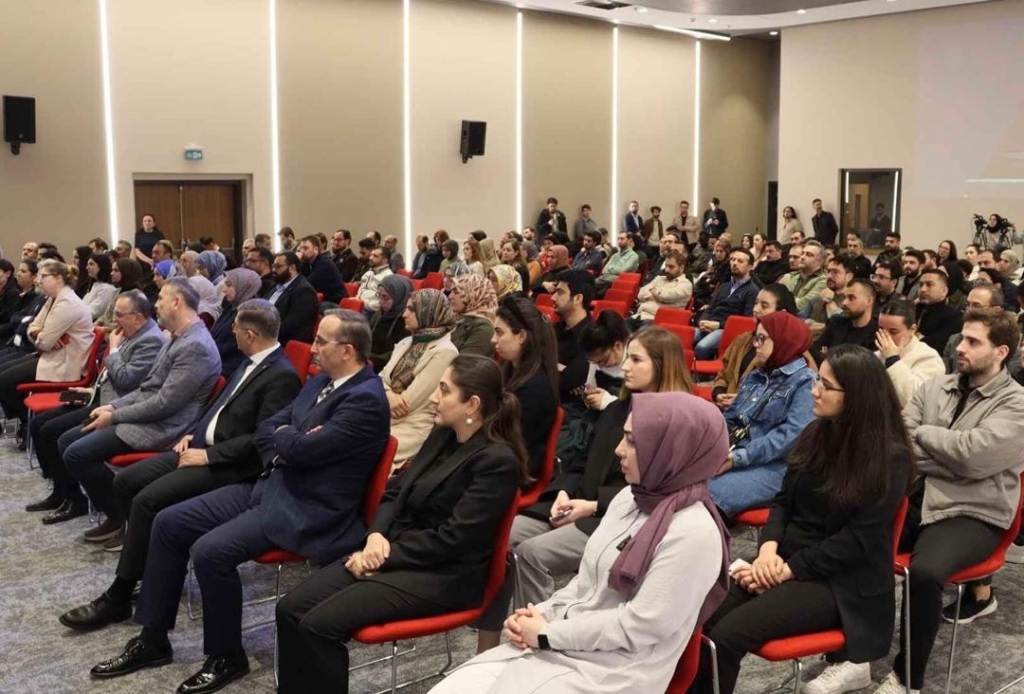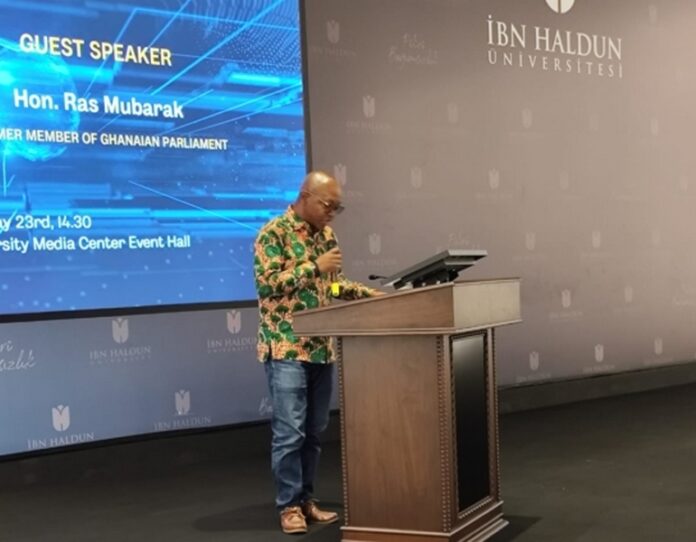Former Ghanaian Member of Parliament, Ras Mubarak, has called into question the effectiveness of Africa’s democratic systems, stating that democracy must go beyond the ritual of elections to deliver dignity, sovereignty, and real socio-economic progress for the continent’s people.
Speaking at Ibn Haldun University in Istanbul as part of Africa Union Day commemorations, Mubarak told a packed auditorium of students and academics that cosmetic democracy without self-determination is a betrayal of Africa’s liberation struggle.
“Democracy matters. But real democracy must be rooted in dignity, political and economic independence, and the will of the people – not in foreign validation or scripted elections,” he said.
His critique comes at a time when African democracies are under growing scrutiny for failing to translate political transitions into transformative change. Mubarak urged African youth, especially those studying abroad, to question the prevailing political structures and lead the push for authentic governance. “You must no longer settle for casting votes for stooges and placeholders,” he charged. “Because if you don’t lead, others will keep misleading.”

Drawing attention to the shifting political landscape in the Sahel, Mubarak highlighted Burkina Faso’s Captain Ibrahim Traoré as a controversial but symbolic figure of a new African awakening.
“He’s not democratically elected. But he is confronting the failures of decades of so-called democracy that delivered no dignity,” he noted. “He is using power to serve, not to submit.”
Mubarak pointed to the bold actions of the Burkina Faso government in reclaiming control over gold resources and expelling foreign troops as signs of a continent beginning to shake off its neo-colonial constraints.
“This Sahelian wave is not instability – it is clarity. It is not a rebellion; it is a rebirth,” he added.
In his address, Mubarak also condemned the persistent influence of external forces in African policy decisions, blaming foreign powers for undermining regional cooperation and stalling development.
“Our leaders are too often beholden to foreign interests. They dance to the tune of their puppet masters in Washington, Brussels, London, and Paris, who benefit from our division and dependence,” he said.
Using the example of the yet-to-be-implemented ECOWAS single currency, the Eco, Mubarak criticised the lack of political will. “I was a teenager when that conversation began. I turn 46 this June, and we’re still talking.”
He described the current state of intra-African relations as a farce, citing restrictive visa regimes and disjointed trade systems that favour former colonial powers over African neighbours. “It is unacceptable that a student in Accra pays more to fly to Abuja than to Brussels. Why should a Ghanaian need a visa to visit Botswana?”
Turning his attention to global partnerships, Mubarak advocated for stronger alliances with the Global South, saying countries like China, Brazil, Russia, and Turkey offer more equitable prospects for collaboration.
“We must stop looking West for validation and solutions. It’s time to look East and South – to partners who share our struggles and won’t dictate to us.” He challenged African students to unlearn colonial conditioning and rediscover the value of indigenous knowledge and culture.
“That belief that Western ways are superior is brainwashing,” he said. “Our ancestors, our elders, and our innovators have wisdom that the world needs to see and respect.”
As his speech drew to a close, Mubarak called for a united front to tackle Africa’s pressing challenges, from youth unemployment and food insecurity to social inequality and climate change. He appealed for a spirit of consensus among African political players and institutions.
“We will fail if we spend half the time campaigning and the other half fighting among ourselves. The youth care more about opportunity than party colours.”
In a passionate conclusion, he expressed solidarity with the people of Palestine, condemning Israel in uncompromising terms and urging Africans to support Palestinian liberation efforts.
“Africans who’ve suffered slavery, colonialism and neo-colonialism should understand the oppression of Palestinians. Israel is a gangster terrorist entity whose leaders must face justice.”
Ras Mubarak ended his address by invoking the vision of Ghana’s founding father, Kwame Nkrumah: “The independence of Ghana is meaningless unless it is linked with the total liberation of the African continent.”
He called on African students everywhere to rise not just as witnesses to history, but as its authors.“There is hope, my friends. If we are all Traoré, Nkrumah, Lumumba and Acheampong – we can bring hope to where there is despair.”



